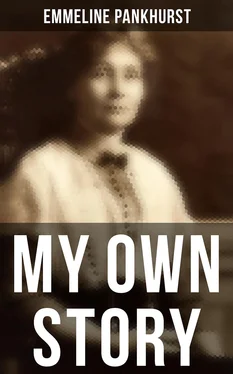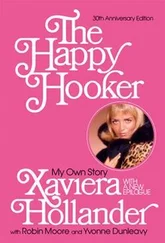All these years my daughters had been growing up. All their lives they had been interested in women's suffrage. Christabel and Sylvia, as little girls, had cried to be taken to meetings. They had helped in our drawing-room meetings in every way that children can help. As they grew older we used to talk together about the suffrage, and I was sometimes rather frightened by their youthful confidence in the prospect, which they considered certain, of the success of the movement. One day Christabel startled me with the remark: "How long you women have been trying for the vote. For my part, I mean to get it."
Was there, I reflected, any difference between trying for the vote and getting it? There is an old French proverb, "If youth could know; if age could do." It occurred to me that if the older suffrage workers could in some way join hands with the young, unwearied and resourceful suffragists, the movement might wake up to new life and new possibilities. After that I and my daughters together sought a way to bring about that union of young and old which would find new methods, blaze new trails. At length we thought we had found a way.
Table of Contents
In the summer of 1902—I think it was 1902—Susan B. Anthony paid a visit to Manchester, and that visit was one of the contributory causes that led to the founding of our militant suffrage organisation, the Women's Social and Political Union. During Miss Anthony's visit my daughter Christabel, who was very deeply impressed, wrote an article for the Manchester papers on the life and works of the venerable reformer. After her departure Christabel spoke often of her, and always with sorrow and indignation that such a splendid worker for humanity was destined to die without seeing the hopes of her lifetime realised. "It is unendurable," declared my daughter, "to think of another generation of women wasting their lives begging for the vote. We must not lose any more time. We must act."
By this time the Labour Party, of which I was still a member, had returned Mr. Keir Hardie to Parliament, and we decided that the first step in a campaign of action was to make the Labour Party responsible for a new suffrage bill. At a recent annual conference of the party I had moved a resolution calling upon the members to instruct their own member of Parliament to introduce a bill for the enfranchisement of women. The resolution was passed, and we determined to organise a society of women to demand immediate enfranchisement, not by means of any outworn missionary methods, but through political action.
It was in October, 1903, that I invited a number of women to my house in Nelson street, Manchester, for purposes of organisation. We voted to call our new society the Women's Social and Political Union, partly to emphasise its democracy, and partly to define its object as political rather than propagandist. We resolved to limit our membership exclusively to women, to keep ourselves absolutely free from any party affiliation, and to be satisfied with nothing but action on our question. Deeds, not words, was to be our permanent motto.
To such a pass had the women's suffrage cause come in my country that the old leaders, who had done such fine educational work in the past, were now seemingly content with expressions of sympathy and regret on the part of hypocritical politicians. This fact was thrust upon me anew by an incident that occurred almost at the moment of the founding of the Women's Social and Political Union. In our Parliament no bill has a chance of becoming a law unless it is made a Government measure. Private members are at liberty to introduce measures of their own, but these rarely reach the second reading, or debatable stage. So much time is given to discussion of Government measures that very little time can be given to any private bills. About one day in a week is given over to consideration of private measures, to which, as we say, the Government give facilities; and since there are a limited number of weeks in a session, the members, on the opening days of Parliament, meet and draw lots to determine who shall have a place in the debates. Only these successful men have a chance to speak to their bills, and only those who have drawn early chances have any prospect of getting much discussion on their measures.
Now, the old suffragists had long since given up hope of obtaining a Government suffrage bill, but they clung to a hope that a private member's bill would some time obtain consideration. Every year, on the opening day of Parliament, the association sent a deputation of women to the House of Commons, to meet so-called friendly members and consider the position of the women's suffrage cause. The ceremony was of a most conventional, not to say farcical character. The ladies made their speeches and the members made theirs. The ladies thanked the friendly members for their sympathy, and the members renewed their assurances that they believed in women's suffrage and would vote for it when they had an opportunity to do so. Then the deputation, a trifle sad but entirely tranquil, took its departure, and the members resumed the real business of life, which was support of their party's policies.
Such a ceremony as this I attended soon after the founding of the W. S. P. U. Sir Charles M'Laren was the friendly member who presided over the gathering, and he did his full duty in the matter of formally endorsing the cause of women's suffrage. He assured the delegation of his deep regret, as well as the regret of numbers of his colleagues, that women so intelligent, so devoted, etc., should remain unenfranchised. Other members did likewise. The ceremonies drew to a close, but I, who had not been asked to speak, determined to add something to the occasion.
"Sir Charles M'Laren," I began abruptly, "has told us that numbers of his colleagues desire the success of the women's suffrage cause. Now every one of us knows that at this moment the members of the House of Commons are balloting for a place in the debates. Will Sir Charles M'Laren tell us if any member is preparing to introduce a bill for women's suffrage? Will he tell us what he and the other members will pledge themselves to do for the reform they so warmly endorse?"
Of course, the embarrassed Sir Charles was not prepared to tell us anything of the kind, and the deputation departed in confusion and wrath. I was told that I was an interloper, an impertinent intruder. Who asked me to say anything? And what right had I to step in and ruin the good impression they had made? No one could tell how many friendly members I had alienated by my unfortunate remarks.
I went back to Manchester and with renewed energy continued the work of organising for the W. S. P. U.
In the spring of 1904 I went to the annual conference of the Independent Labour Party, determined if possible to induce the members to prepare a suffrage bill to be laid before Parliament in the approaching session. Although I was a member of the National Administrative Council and presumably a person holding some influence in the party, I knew that my plan would be bitterly opposed by a strong minority, who held that the Labour Party should direct all its efforts toward securing universal adult suffrage for both men and women. Theoretically, of course, a Labour party could not be satisfied with anything less than universal adult suffrage, but it was clear that no such sweeping reform could be effected at that time, unless indeed the Government made it one of their measures. Besides, while a large majority of members of the House of Commons were pledged to support a bill giving women equal franchise rights with men, it was doubtful whether a majority could be relied upon to support a bill giving adult suffrage, even to men. Such a bill, even if it were a Government measure, would probably be difficult of passage.
Читать дальше












